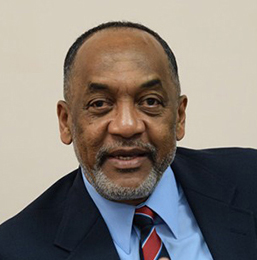While the Environmental Protection Agency (EPA) will not have all the resources needed for complete oversight of the petroleum sector by first oil next year, Executive Director Dr. Vincent Adams believes that with current reforms underway and key help from the World Bank it will at least be prepared.
“The EPA is working with the Department of Energy (DoE), the CDC [Civil Defence Commission] and its multi-agency group and government to ensure this country is prepared for first oil and beyond. We also have support from the World Bank to do a gap analysis… and government is throwing its support behind us all to ensure this happens,” Adams told Sunday Stabroek in an interview.
“If everything I have told you comes to fruition, I think we will be prepared and with time we will strengthen because we have the support from both government and the oil companies, more specifically ExxonMobil, because it is EEPGL [Esso Exploration and Production Guyana Limited] that will first start pumping next year. We will have persons monitoring on the ships and not the office,” he added.
Adams explained that knowing Guyana’s limitations in the oversight of the petroleum sector, the World Bank has stepped in to help. Through the World Bank, the man who spearheaded Mexico’s Agency for Security, Energy and the Environment (ASEA), Carlos de Regules, is now serving as a consultant, in an arrangement facilitated by the DoE.
“Mr De Regules is currently undertaking a gap analysis of the EPA and will make recommendations…he is here working with me, through the Department of Energy. The funding came through the DoE and what basically he is doing is developing this gap analysis to identify the talents needed and down to the details of funding what we will need, what is the structure necessary for managing the petroleum industry and those things,” Adams said.
“Already, we have identified that the staff needs more exposure and we have [been] working on that, even as he plans. My staff are going to international conferences, where they can also get the opportunity to network. So, in the meantime, we have more exposure, more training, as we find funding to provide sustainable oversight necessary,” he added.
Short on the funding and staff needed to ensure its ability to monitor for compliance, Adams had told this newspaper that the agency planned to raise fees for permits and services. This will begin this year. The EPA’s current fees, which have not been adjusted since the agency’s inception 23 years ago, have been labelled “chicken feed” by Minister of Finance Winston Jordan and it was he who had urged that the agency revise them to meet its financial needs.
He had advised that rather than wait until next year, the EPA should begin immediate plans to hike fees since there is ample justification, given that it has been at the same paltry amounts for over two decades, and an increase only requires approval from the agency’s Board.
While he did not want to yet state what the increases would be, Adams informed that the EPA has decided on the fees and is reorganising the agency.
Inspire the youth
And as it pertains to staffing, Adams lamented that while the agency had advertised locally and on social media for special staff, the response has been abysmally poor.
“We sent out for expressions of interests for vacancies and the response was not what I expected. It was really terrible. I have not gotten a response from anyone who is petroleum specific. I guess we will have to go regionally and internationally. I don’t know, I just expected a better response,” he said.
“No, I am not daunted. We have to go again, that is all. My plan now is to go out there and advertise more strongly, especially in the diaspora. I know that for every position, including these high petroleum expertise positions, I can find a Guyanese. We have to make the effort, and since the last round of advertising didn’t come out the way we thought it would, we just have to come up with a plan to make it broader,” he added.
A US Department of Energy top official for many years, Adams said that there is a sensitivity among some persons that brining persons from the diaspora would rob Guyana’s young of the opportunity to advance. He said that this should not be, as there should be discussions with this country’s youth on plans that would see transfer of knowledge from the old to the young, over a specified period.
“I know what exists in the diaspora and many persons feel a sense of responsibility to their homeland now that they are established and would love to give back. You have senior people [who] want to come back and I mean not come back to take any position or job permanently but work on a contract, even if it [requires] that they develop the talent here over a time and then they go. Taking myself for example, I have been giving back for decades before I started here. Now that I am here, I want this agency to be different. I want to share all of my knowledge with them because I cannot take it anywhere. That transfer will be the developing of the talent we already have here. When I leave here in a few years, we will have young Guyanese with a sense of purpose and who would have acquired skills and can run this agency well,” he stressed.
“Petroleum engineering and areas pertaining to the oil sector has very specialised fields. But it is not that we can’t find people to come back and train our youth to take over this thing for themselves, we could and we just have to make the effort to look. We must find people not to build a career here, but to serve and help the young to take over. When they leave, our nation must know that they are in very capable hands because we would have built the capacity. We want to inspire the young people; yes, we don’t want people to stifle the young talent. It will be a win-win situation for the nation and the diaspora,” he added.
‘Support’
Both Jordan and former Minister of State Joseph Harmon came in for high praise from Adams, who said that they have pledged to support the agency as it pushes to be weaned off of government’s financing to be a self-funded agency in years to come.
“Next year is going to be my first budget year and I’ll have to submit needs this year to the Minister of Finance. In the meantime, we will spend and have begun spending the money allocated for the 2019 period and those we got in terms of fees so far. The Board itself has been so helpful in all the process. We went out and are buying some basic lab equipment and so on… we purchased a new vehicle and are in the process of purchasing two other new vehicles. As funding becomes available, we will purchase in order of priority but the list is very long,” he said.
“In all of this, it would be remiss of me to not point out the support I have gotten, especially from my subject minister, Joseph Harmon. He has been our biggest supporter and advocate all the way, after learning of all that is needed he is there supporting us and ensuring we have what is needed. Should we be moving at a faster pace? Absolutely. But we are progressing and moving in the right direction with what we have,” he added.
In one of his last assignments as minister, Harmon last Thursday, at the commissioning ceremony for the new EPA building at Whim Village, Berbice, assured that mechanisms are being put in place to deal with potential oil spills offshore Guyana.
Harmon pointed out that Guyanese often agonise over what would happen in the case of an oil spill but are not planning enough for such an eventuality.
His government, he believes, is proactive and has set up ongoing collaborations between agencies, including the EPA, to deal with present and future issues that will affect Guyana. “I am satisfied that the plans that are being put in place will serve us well in an event that something unfortunate were to happen in the oilfields that develop offshore of Guyana,” he said. It is the inter-agency group that Adams had also discussed.
Guyana, Harmon noted, is a part of an international alliance of countries that can be affected in the case of an oil spill offshore and as a result, staff attached to the relevant agencies have had the opportunity of going abroad and studying the experiences of other countries in similar cases. “I have been to practices where we actually practice in the event of a spill what is going to happen and what are the agencies’ responsibilities and we have actually started to put in place mechanisms that will assist us to ameliorate any loss which can occur as a result of these circumstances,” he said.
Adams said that in addition to the support of agencies, ExxonMobil has also been giving its share of assistance.
The EPA, he said, now has two dedicated persons dealing with petroleum issues. And while they are not specialists, the agency is ensuring that they undergo a series of training to equip them in their roles.
They will be sent for firsthand training onboard ExxonMobil’s offshore vessels in the coming weeks, and are currently preparing for that assignment. “You cannot monitor from onshore alone and I have stated that I will be sending my people in to spend days and weeks and not just fly in for a day and be out. So the two persons I told you about are preparing for that. Where they are getting training onboard ship. All of this could not be possible without the cooperation and help of the ExxonMobil and I have to let it be known that they are working with us every step of the way,” he said.






